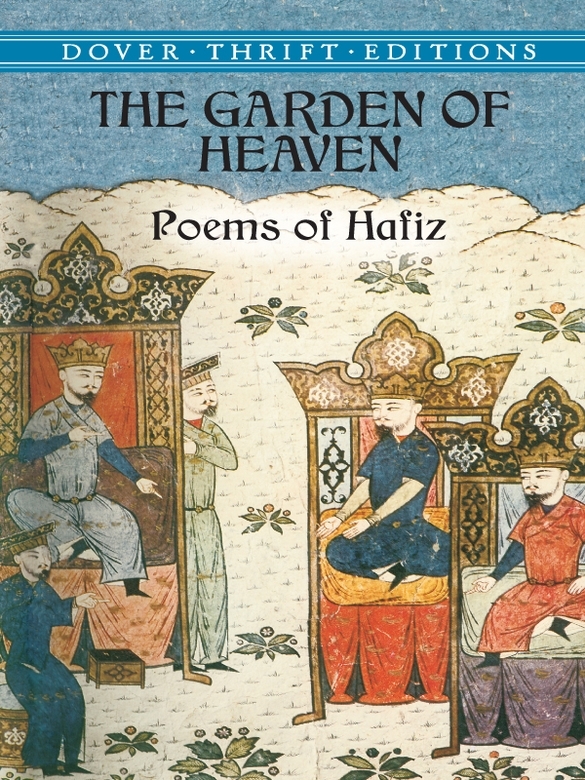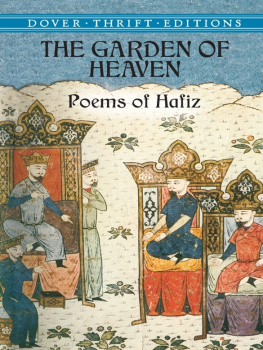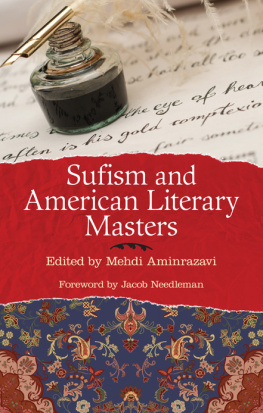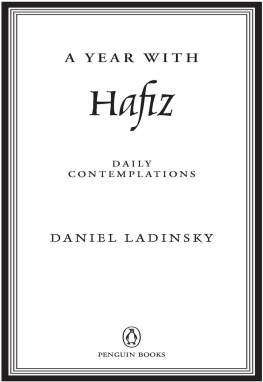Hafiz - The Garden of Heaven: Poems of Hafiz
Here you can read online Hafiz - The Garden of Heaven: Poems of Hafiz full text of the book (entire story) in english for free. Download pdf and epub, get meaning, cover and reviews about this ebook. year: 2012, publisher: Dover Publications, genre: Science. Description of the work, (preface) as well as reviews are available. Best literature library LitArk.com created for fans of good reading and offers a wide selection of genres:
Romance novel
Science fiction
Adventure
Detective
Science
History
Home and family
Prose
Art
Politics
Computer
Non-fiction
Religion
Business
Children
Humor
Choose a favorite category and find really read worthwhile books. Enjoy immersion in the world of imagination, feel the emotions of the characters or learn something new for yourself, make an fascinating discovery.
The Garden of Heaven: Poems of Hafiz: summary, description and annotation
We offer to read an annotation, description, summary or preface (depends on what the author of the book "The Garden of Heaven: Poems of Hafiz" wrote himself). If you haven't found the necessary information about the book — write in the comments, we will try to find it.
Hafiz: author's other books
Who wrote The Garden of Heaven: Poems of Hafiz? Find out the surname, the name of the author of the book and a list of all author's works by series.
The Garden of Heaven: Poems of Hafiz — read online for free the complete book (whole text) full work
Below is the text of the book, divided by pages. System saving the place of the last page read, allows you to conveniently read the book "The Garden of Heaven: Poems of Hafiz" online for free, without having to search again every time where you left off. Put a bookmark, and you can go to the page where you finished reading at any time.
Font size:
Interval:
Bookmark:

Stanza 1.The first line of this song, the opening poem in the Divan, is borrowed from an Arabic poem by Yezid ibn Moawiyah, the second Khalif of the Ommiad line. This prince was held in abomination by the Persian Shiites, both as the head of the Sunnis and because he was the cause of the death of Hussein, the son of Ali, whom the Shiites regarded as the rightful successor to the Khalifate. Hafiz was frequently reproached for setting a quotation from the works of the abhorred Yezid at the head of his book, a reproach which he is said to have met with the reply, that it was good policy to steal from the heretics whatsoever they possessed of worth.
In this country (i.e. North-Eastern China) is found the best musk in the world, and I will tell you how it is produced. There exists in that region a kind of wild animal like a gazelle. It has feet and tail like the gazelles, a stags hair of a very coarse kind, but no horns. It has four tusks, two below and two above, about three inches long, and slender in form, one pair growing downwards and the other upwards. It is a very pretty creature. The musk is found in this way: when the creature has been taken, they find at the navel, between the flesh and the skin, something like an imposthume filled with blood, which they cut out and remove, with all the skin attached to it; and the blood inside this imposthume is the musk that produces that powerful perfume. There is an immense number of these beasts in the country we are speaking of. The flesh is very good to eat. Messer Marco brought the dried head and feet of one of these animals to Venice with him.Travels of Marco Polo.
There is a play of meaning upon the musk which is obtained at the cost of the deers life-blood and the tears of blood which the lover weeps for his mistress.
Stanza 2.The title which Hafiz gives to the Tavern-keeper is Pir-i-Maghanliterally, the Old Man of the Magians. The history of this title is an epitome of the history of Persian faiths. It indicated primarily the priest of the first of Persian religions, that of Zoroaster. When the Mahommadans invaded Persia, and the preachers of the Prophet supplanted the priests of Zoroaster, their title fell into disrepute, and was degraded so far that it came to mean only the keeper of a tavern or caravanserai. But in this sense it gradually regained the honourable place from which it had fallen; for the keepers of such places of resort were, for the most part, men well acquainted with the ways of the road and the hostelry. In their time they may themselves have served travellers upon their journey; they had heard and learnt much from the wayfarers who stopped at their gates, and they were able to guide others upon their journey, sending them forth refreshed and comforted in body. And here the Sufis took up the ancient name and used it to mean that wise old man who supplied weary travellers upon lifes road with the spiritual draught of Sufi doctrine which refreshes and comforts the soul.
Stanza 1.This poem has been expounded to me as a description of the poets quest for love. In an allegory he shows how he looked for it in vain from that image of earthly devotion, the nightingale; he warns men that it comes not but by humiliation and sorrow; he questions the magic garden, but its breezes cannot answer him; finally, he concludes that love is not that which lies upon the lips of men, and calls upon the Cup-bearer to silence their idle talk with the wine of divine knowledge.
Stanza 2.The Garden of Irem was planted by the mythical King Shedad, the son of Ad, the grandson of Irem, who was himself the son of Shem. The tribe of Ad settled in the sandy deserts near Aden, where Ad began the building of a great city which his son completed. Round his palace Shedad planted a wonderful garden which was intended to rival in beauty the Garden of Eden. When it was finished he set out with a great attendance to take a view of it, but when they were come within a days journey of the place they were all destroyed by a terrible noise from heaven.... The city, they tell us, is still standing in the deserts of Aden, being preserved by Providence as a monument of divine justice, though it be invisible, unless very rarely, when God permits it to be seen, a favour one Colabah pretended to have received in the reign of the Khalif Moawiyah, who, sending for him to know the truth of the matter, Colabah related his whole adventure: that, as he was seeking a camel he had lost, he found himself on a sudden at the gates of this city, and entering it, saw not one inhabitant, at which being terrified, he stayed no longer than to take with him some fine stones which he showed the Khalif.Sales Koran.
Sudi says that Hafiz composed this poem in a beautiful garden belonging to Shah Shudja, and called by him the Bagh-i-Irem, after Shedads legendary Paradise.
Il y avait jadis en Perse un grand roi nomm Djem ou Djemshid. Il rgna sept cents ans; je ne saurai vous dire quelle date au juste, mais tant quil rgna, il ny eut dans son empire ni mort, ni maladie, ni vieillesse, et tous les hommes marchaient dans la taille de jouvenceaux de quinze ans; il ny avait ni chaleur, ni froideur, et jamais ne se desschaient les eaux ni les plantes. Mais le pauvre Djem navait point la tte solide, et, comme il faisait des immortels, il se crut Dieu et voulut tre ador. Aussitt, le Fari Yazdan, cest--dire la gloire royale qui vient de Dieu, labandonna; un serpent trois ttes, nomm Zohab, vint de lArabie et lui prit son trne; il senfuit dans lInde et y resta chach mille ans durant; puis un beau jour, stant aventur hors de sa retraite, il fut livr au serpent, qui le scia en deux avec une arte de poisson. Entre autres splendeurs, le roi Djemshid, au temps de sa splendeur, poss-dait une coupe magique o il voyait tout lunivers et tout ce qui sy passe. Certains savants prtendent que cette coupe tait le soleil qui voit toute chose; dautres, que ctait un globe terrestre mis au courant, et il me souvient quil y a deux ans, prenant le th dans un caf de Stamboul avec un sage dIsfahan, nomm Habib, la conversation tomba de la tasse de th la coupe de Djemshid, et Habib, me mettant le doigt au front, me dit: Djam-i-Djemshid, dil-i-agah: la coupe de Djemshid cest le cur de lhomme de science.Darmsteter, Lettres sur lInde.
A few miles from Peshawar, Darmsteter goes on to relate, there is a dried-up pond called the Talab i Djemshid, into which the King is said to have cast his magic cup. The head man of the village told the French traveller that a knife had been discovered there bearing this inscription: This pond was dug by me, Djemshid, five hundred years before the Hejra. Elle na pas t retrouve, la coupe de Djemshid, adds Darmsteter, non plus que la coupe du roi de Thul, cest pour a quil ny a plus parmi les hommes ni science, ni amour.
Djemshid is supposed to have built Persepolis. There is a legend that his cup was found buried in its foundations, and that it was formed of an enormous turquoise. It is said that he was the first to drink wine, and that he recommended it to his subjects as a health-giving beverage. He, too, was the father of chemistry and the possessor of the philosophers stone.
Stanza 1.King Solomon sent the lapwing or hoopoe as his messenger to Bilkis, Queen of Sheba. The story is told thus by Al Talabi, in his Stories of the Prophets. (The lapwing had already made a journey on his own account, and had brought Solomon news of the great Queen, and told him that she was not a worshipper of the true God.) Then Solomon wrote a letter saying: From the servant of God, Solomon, son of David, to Bilkis, Queen of Saba, in the name of God the Merciful, the Compassionate, peace be upon him who follows the right road. After which he said: Behave not insolently towards me, but come unto me humbled. And he strewed musk upon it and sealed it with his seal. Then he said to the lapwing: Fly with this letter and deliver it unto them, then turn away, but remain near them and hear what answer they make. And the lapwing took the letter and flew with it to Bilkis. And she was in the land which is called Marib, at a distance of three days journey, and she had entered into her castle, and the gates of it were shut. For when she slept she was wont to shut the gates and to take the key and lay it beneath her head. So the lapwing came unto her, and she was asleep, lying upon her back; and he laid the letter upon her breast. Wahb ibn Manabbih says that there was a window opposite to the sun so that the sunbeams fell through it at dawn, and when she saw the sun she was wont to bow down and worship it. And the lapwing went to this window and blocked it up with his wings. And the sun rose, but she knew it not. And she thought that the sun was late, and stood up to look for it. Then the lapwing threw a leaf upon her face. And they say that Bilkis took the letter and she was able to read the writing. But when she saw the seal she trembled and bowed down, because of the power of Solomon that was in his seal. For she knew that the power of him who had sent the letter was greater than hers, and she said: Lo, here is a king whose messengers are the birds; verily he is a mighty king.
Font size:
Interval:
Bookmark:
Similar books «The Garden of Heaven: Poems of Hafiz»
Look at similar books to The Garden of Heaven: Poems of Hafiz. We have selected literature similar in name and meaning in the hope of providing readers with more options to find new, interesting, not yet read works.
Discussion, reviews of the book The Garden of Heaven: Poems of Hafiz and just readers' own opinions. Leave your comments, write what you think about the work, its meaning or the main characters. Specify what exactly you liked and what you didn't like, and why you think so.













